Toledo District | |
|---|---|
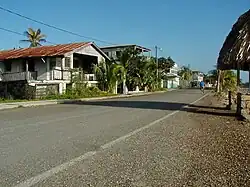 Punta Gorda is the main town in the Toledo District. | |
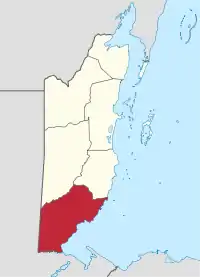 Location of the district in Belize | |
| Country | |
| Capital | Punta Gorda |
| Area | |
| • Total | 4,649 km2 (1,795 sq mi) |
| Population | |
| • Total | 35,800 |
| • Density | 7.7/km2 (20/sq mi) |
| ISO 3166 code | BZ-TOL |
| Website | southernbelize |
Toledo District is the southernmost and least populated district in Belize. Punta Gorda is the District capital. According to the Human Development Index (HDI),[3] it is the second most developed region in the country. The district has a diverse topography which features rainforests, extensive cave networks, coastal lowland plains, and offshore cays. Toledo is home to a wide range of cultures such as Mopan, Kekchi Maya, Creole, Garifuna, East Indians, Mennonites, Mestizos, and descendants of US Confederate settlers.
Geography
The District has many villages, including Monkey River Town and the Toledo Settlement; the Maya villages of San Pedro Columbia, Blue Creek, Indian Creek, Santa Cruz, San Antonio, San Jose, San Felipe; and the Garifuna village of Barranco. It also has a number of Maya ruins, including Lubaantun, Nim Li Punit, Uxbenka, and Pusilha. According to a 2022 mid-year census estimate, Toledo District had a population of 41,537 people, 6,801 of whom lived in Punta Gorda.
Economy
The economy of Toledo relies heavily upon agriculture. Crops grown include beans and corn, as well as rice, which is sold to the Big Falls Rice Mill. Cacao is grown organically and sold via the Toledo Cacao Growers Association to Green & Black's for their renowned Maya Gold chocolate, as well as to chocolatiers within Belize. The District's ancient and modern-day links with chocolate are celebrated annually in May (Commonwealth Day Holiday weekend) at the Toledo Cacao Festival. Farmers grow additional crops such as coffee, yams, sweet potato, hot chilli peppers, avocado, oranges and plantain for sale at the market in Punta Gorda, held each Monday, Wednesday, Friday, and Saturday.
Fishermen in Toledo engage in small-scale fishing using dug-out canoes, and they also partake in lobster and conch diving during the open season. The Port Honduras Marine Reserve, situated just north of Punta Gorda Town, is a designated protected area. Toledo's waters are renowned for being a prime location for catching permit fish. Many traditional fishermen have transitioned to becoming fly-fishing guides, thanks to alternative livelihood initiatives offered by local conservation groups.
Tourism has emerged as a significant industry in Toledo. While it was once considered a destination mainly for the intrepid, the establishment of new tourist accommodations and the development of guided tours, coupled with the district's abundance of protected areas, diverse wildlife, exceptional bird-watching opportunities, and appealing offshore cays, have collectively contributed to Toledo's recognition as a burgeoning and valuable travel destination.
Language
According to the 2010 census, Mayan languages are spoken by 68.4% of the population. This makes Toledo the only district in Belize where native languages are spoken by a majority. [4]
Gallery
 Blue Creek River, Belize
Blue Creek River, Belize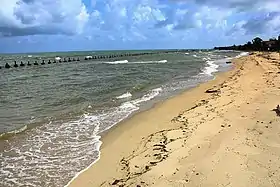 Monkey River Village
Monkey River Village San Miguel Branch
San Miguel Branch Swasey Branch
Swasey Branch Bladen Reserve looking towards the Maya Mountains
Bladen Reserve looking towards the Maya Mountains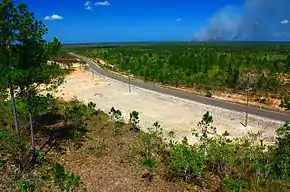 Southern Highway
Southern Highway
Transportation
The Toledo District is served by the paved Thomas Vincent Ramos Highway, as well as several bush roads to the many rural villages in the District. Regular bus service is provided by Punta Gorda-based James Bus Line, shuttling passengers between the other districts, and Punta Gorda is served by several daily commuter flights on Tropic Air, Maya Island Air and several small, family-run bus services that transport passengers to and from the rural villages.
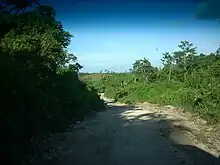
Events
Each year, during the Commonwealth Day weekend, Toledo hosts the Chocolate Festival of Belize. The festival features chocolatiers from across the country as well as chocolate-related arts and crafts.[5] According to the project coordinator for the Toledo Cacao Growers Association Thomas Tillett, the Association currently has a membership of about 1,100 cacao farmers.[6]
Indian Reservations
- Aguacate Indian Reservation, Toledo
- Black Creek Indian Reservation, Toledo
- Blue Creek Indian Reservation, Toledo
- Crique Sarco Indian Reservation, Toledo
- Graham Creek Indian Reservation, Toledo
- Hinchasones Indian Reservation, Toledo
- Machaca Indian Reservation, Toledo
- Xpicilha Indian Reservation, Toledo
Notable architecture
Several significant ancient Mayan sites are extant in ruined form in the Toledo District. Nim Li Punit is a Classic Period Mayan site[7] with ballcourts and carved stelae. Lubaantun is a drystone constructed site with ruined pyramids and stone tombs.[8]
Notable people
- Cristina Coc, Maya community leader[9]
- Juan Coy, politician
See also
- The Forgotten District, a documentary film about ecotourism in Toledo
References
- ↑ "Preliminary Findings of 2010 Census" (PDF). Statistical Institute of Belize.
- ↑ "Belize: Districts, Towns & Villages - Population Statistics, Maps, Charts, Weather and Web Information".
- ↑ "Sub-national HDI - Area Database - Global Data Lab". hdi.gobaldatalab.org.
- ↑ "Languages spoken in Belize" (JPG). May 2017. Archived from the original on 2018-02-18. Retrieved 2023-05-21.
- ↑ "Chocolate Festival of Belize". The Toledo Howler. 6 (2): 1. 2013.
- ↑ Jones, Patrick.Toledo Celebrates Cacoa Festival. "Breaking Belize News (Belize Media Group News)." 25 May 2014 (retrieved 25 May 2014)
- ↑ Nim Li Punit, published by the Department of Archaeology, Belmopan, Belize, Project ACP-RPR 544, Cubola Productions, March, 1999
- ↑ C.Michael Hogan, Lubaantun, 2007, The Megalithic Portal, editor: A. Burnham
- ↑ "Our Belize Community—Cristina Coc". The San Pedro Sun. San Pedro Town, Belize. 10 January 2008. Archived from the original on 4 March 2016. Retrieved 6 December 2016.
External links
- Official website - with maps and area attractions
- Toledo District at belize.fm
- The Toledo Howler Archived 2010-09-20 at the Wayback Machine - quarterly newspaper published by the BTIA Toledo Chapter
- How to Cook a Tapir - a Belize memoir, documenting the author's year-long working honeymoon in the Toledo District
- Treehouse Perspectives - Living High on Little - the story of the Salisbury family's move and new life in Punta Gorda
- Governmental influence on ecotourism in Toledo - Influence or interference?